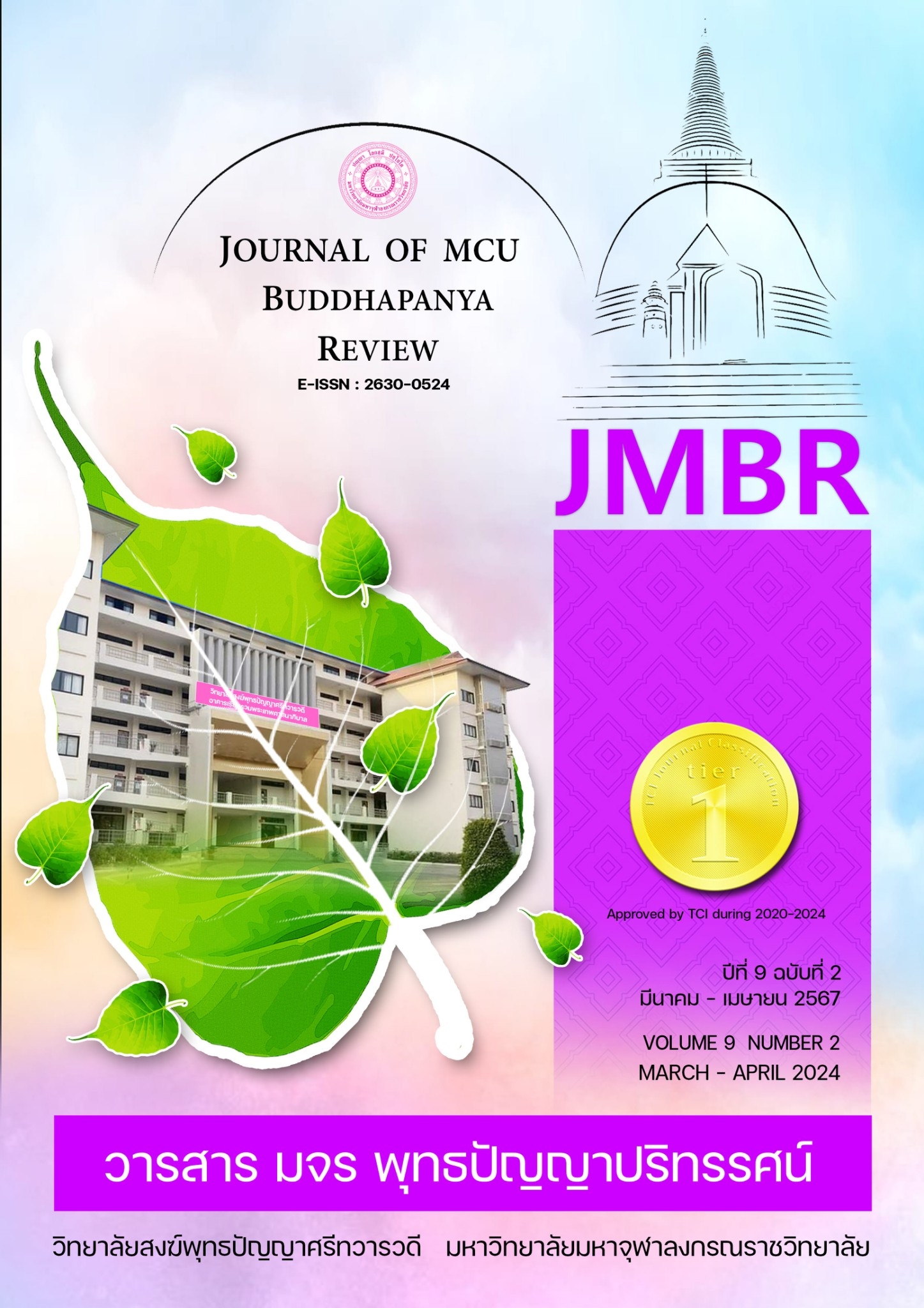การจัดการเรียนรู้แบบบูรณาการชุมชนโดยใช้โครงงานเป็นฐาน เพื่อพัฒนาผลสัมฤทธิ์ทางการเรียนและทักษะทางวิชาชีพบัญชี
คำสำคัญ:
การเรียนรู้แบบบูรณาการชุมชน; , โครงงานเป็นฐาน; , ผลสัมฤทธิ์ทางการเรียน; , ทักษะทางวิชาชีพบัญชีบทคัดย่อ
การวิจัยครั้งนี้มีวัตถุประสงค์เพื่อ 1) เปรียบเทียบผลสัมฤทธิ์การเรียนก่อนและหลังการจัดการเรียนรู้แบบบูรณาการชุมชนโดยใช้โครงงานเป็นฐานของนักศึกษาสาขาวิชาการบัญชี 2) ประเมินระดับทักษะทางวิชาชีพบัญชีตามมาตรฐานการศึกษาระหว่างประเทศสำหรับผู้ประกอบวิชาชีพบัญชี (IESs) หลังจากการจัดกิจกรรมการเรียนรู้ 3) ศึกษาความพึงพอใจของนักศึกษาสาขาวิชาการบัญชีที่ได้รับจากการจัดการเรียนรู้แบบบูรณาการชุมชนโดยใช้โครงงานเป็นฐาน การวิจัยครั้งนี้เป็นการวิจัยเชิงทดลอง กลุ่มตัวอย่างเป็นนักศึกษาสาขาวิชาการบัญชีชั้นปีที่ 2 จำนวน 34 คน ใช้วิธีการสุ่มอย่างง่าย เครื่องมือที่ใช้ในการวิจัย ได้แก่ 1) แผนการจัดการเรียนรู้ด้วยวิธีการจัดการเรียนรู้แบบบูรณาการชุมชนโดยใช้โครงงานเป็นฐาน เรื่อง การจัดประเภทต้นทุนและการคำนวณต้นทุนการผลิต 2) แบบทดสอบผลสัมฤทธิ์การเรียนรู้และแบบประเมินทักษะวิชาชีพบัญชี 3) แบบประเมินความพึงพอใจจากการจัดการเรียนรู้ การวิเคราะห์ข้อมูลโดยใช้ค่าเฉลี่ย ส่วนเบี่ยงเบนมาตรฐาน (S.D.) ของคะแนนจากการประเมินผลสัมฤทธิ์ทางการเรียน และการทดสอบค่าที ประเมินทักษะทางวิชาชีพด้วยโดยใช้การประเมินตามสภาพจริง คะแนนรายทักษะในลักษณะรูบริคส์ 3 ระดับ
ผลการวิจัยพบว่า 1) ผลสัมฤทธิ์ทางการเรียนของนักศึกษาสาขาวิชาการบัญชี หลังการจัดการเรียนรู้แบบบูรณาการชุมชนโดยใช้โครงงานเป็นฐานสูงกว่าก่อนการจัดการเรียนรู้ อย่างมีนัยสำคัญทางสถิติที่ระดับ .05 2) ทักษะทางวิชาชีพบัญชี ทั้ง 5 ด้าน ได้แก่ ทักษะทางปัญญา ทักษะทางวิชาการเชิงปฏิบัติและหน้าที่งาน ทักษะทางคุณลักษณะเฉพาะบุคคล ทักษะทางปฏิสัมพันธ์กับผู้อื่นและการสื่อสาร และทักษะทางองค์การและการจัดการธุรกิจ มีผลประเมินในระดับดี (M=11.25, S.D.=0.78) และ3) ความพึงพอใจต่อการจัดการเรียนแบบบูรณาการชุมชนโดยใช้โครงงานเป็นฐานอยู่ในระดับมาก
เอกสารอ้างอิง
Anazifa, R. D., & Djukri. (2017). Project – Based Learning and Problem – Based Learning : are they Effective to Improve Student’s Thinking Skills ?. Journal Pendidikan IPA Indonesia. 6(2), 346-355.
Bahari, A. Azmi, W. and Anshar, A. (2021). Effect of project-based learning model on student’s performance at accounting information system course. 650, 108-113.
Chanchang, J. (2020). Integrated teaching and learning management for the development of higher order thinking skills:learning to practice. Journal of Education Studies.48(3),78-89.
Chekplengpin, M. (2019). The development of learning achievement in economics strand and reasoning thinking ability of students on problem-based learning with thing-pair-share technique. Journal of MCU Buddhapanya Review. 4(3), 389-402.
Dewey. J. (1963). Experience and education. New York: Macmillan Publishing CompanyDitkaew, K. (2023). Era 5G Digital Accounting. Bangkok : Chulalongkorn.
Dureh, N. (2021). The project-based learning and growth score for statistical modeling subject. Journal of Education Khon Eaen University. 44(1), 65-76.
EKpatcha, S. (2023). The Development of Learning Achievement on Thai Language Levels and Royal Words of Matthayomsueksa 4 Students Using Flipped Classroom Learning Management. Journal of MCU Buddhapanya Review. 8(3), 186-197.
Federation of Accounting Profession. (2014). International Accounting Education Standard 3: Professional Accounting. Retrieved March 10, 2023, fromhttp://acpro-std- tfac.or.th/2015_IES3.pdf
Gallego, A. C., Donoso Anes, J. A., Atoche, T. D., Borreguero J. H., & Gaviry, R. L. (2018). The Effectiveness of the Project – Based Learning (PrjBL) Approach in Undergraduate Accounting Education. 9, 65-83.
Jamaluddin, N.S., Kadir, S. A., Alias, S. N., & Abdullah, A. (2019). Scaffolding through Project Based Learning on the Change of Student Achievement : A study in Accounting Principles Subject. International Journal of Academic Research in Business and Social Sciences, 9(9), 567-577.
Jessadavirot, S. (2003). Integrated Instruction. Bangkok : Book point.
Khammanee, T. (2012). Teaching: knowledge for organizing an effective learning process. (17sted.). Bangkok: Chulalongkorn University Press.
Kitrungraung, P. Sirisamphan, O. Homchaiyawong, D. and Urabunnualchat, W. (2021). Paradigm shift : Teaching by project-based learning to enhance the essential skills of students in Thailand 4.0 era. Journal of Educational Studies. 15(2), 16-30.
National Statistical Office. (2023). The labor force survey whole kingdom Quarter2 : April – June 2023.
Pangsri, S. (2018). Project-based instruction : Application to practice in nursing education. Journal of Phrapokklao Nursing College. 29(1), 215-222.
Pankaew, J., Sungkachat, B., Dumsangsawat, N. & Numjaraen, T. (2019). Authentic Assessment. Journal of Education. 30(1), 22-33.
Piaget, J. (1972). Intellectual evaluation for adolescence to adulthood. Human Development, 19, 1-12.
Prapasanobol, V & Nillapun, M. (2021). Project-Based Learning Manage. According to the Constructionism Theory. Journal of Research and Curriculum Development.11(2), 8-22.
Promwong, Ch. (2013). Testing the Effectiveness of Media or Teaching Materials. Silpakorn Educational Research Journal, 5(1), 7-20.
Puttaisong, S. & Vunsuwan, Ch. (2018). Integrated Project-Based Learning for Enhancing Learning Achievement, Critical Thinking and Group Working Skill of Mathayom 1 Students. Journal Research for Learning Reform. 1(2), 1-9.
Suwannapha Ch. (2015). Integrated learning management for thinking skill development in a social studies seminar courses for social studies students at Mahachulalongkornrajavidyalaya university phrae campus. 3(2), 1-19.
The Administrative Organization of the Ministry of Education. (2017). The National Scheme of Education B.E. 2560-2579. Bangkok : Prigwhan.
Thongaime, A. (2018). Project based learning for developing student in the 21st century. Valaya Alongkorn Review. 8(3), 185-199.
Thongchiw, A. (2021). A study of learning achievement on word compounding in Thai language of matthayomsueksa 1 students by project-based learning management. Journal of MCU Buddhapanya Review. 7(1), 129-140.
Wongkumsin, T. & Singhwee, Ch. (2020). Project-based learning for development self-directed learning. 46(1), 218-253.
Yingyom, S & Tunya, N. (2022). The development of mathematics instruction model promoting analytical thinking of primary school students. Journal of MCU Buddhapanya Review. 7(3), 296-305.
Yoelao, D. (2014). The study of PBL-based learning management from the Knowledge Building Project to enhance the skill of the 21st century of children and youth: based on the success experiences of Thai schools. Bangkok: Thippawisut.
ดาวน์โหลด
เผยแพร่แล้ว
รูปแบบการอ้างอิง
ฉบับ
ประเภทบทความ
สัญญาอนุญาต
ลิขสิทธิ์ (c) 2024 วารสาร มจร พุทธปัญญาปริทรรศน์

อนุญาตภายใต้เงื่อนไข Creative Commons Attribution-NonCommercial-NoDerivatives 4.0 International License.



